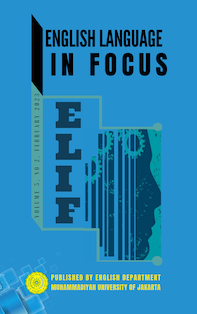Students' Perspectives: BTS Role in Stimulating English Language Learning
DOI:
https://doi.org/10.24853/elif.5.2.119-130Keywords:
English, BTS, PerspectiveAbstract
This research was focused to analyze the students’ responses towards BTS’s influence in stimulating English language learning motivation. This is viewed from the students – who are BTS fans (ARMY) perspective. Based on the analysis, the students’ perspectives are characterized into 3 perspectives, they are behaviorist, cognitivist, and constructivist. In this research, the student’s perspective shows that these 3 learning perspectives are engaged in their learning process through the role of BTS as their stimulation and media for English learning. The data findings also prove that BTS has become an influential factor that attracted students to learn English and pushes their motivation to practice it. The analysis signified that students like learning English better when they are encouraged, interested, and have an access to this media. It means BTS facilitates their understanding of the skills they are acquiring. As a result, their skills are developed and improved well. Moreover, students can use their English language skills to help them achieve their initial goal of studying it. Therefore, It is noteworthy that students’ participation in the study acknowledges the crucial role of BTS as a stimulation of their motivation and asserted the importance of incorporating it in English language learning. As result, BTS does help students to stimulate their English language learning.References
Aisyah, A. (2017). Korean-English language translational action of K-Pop social media content: A case study on Bangtan Sonyeondan’s (BTS) official Twitter. 3L: Language, Linguistics, Literature, 23(3), 67–80. https://doi.org/10.17576/3L-2017-2303-05
Al-Smadi, M. H. (2020). The Effect of Using Songs on Young English Learners’ Motivation in Jordan. International Journal of Emerging Technologies in Learning, 15(24), 52–63. https://doi.org/10.3991/ijet.v15i24.19311
Creswell, J. W. (2012). Educational Research Planning, Conducting, and Evaluating Quantitative and Qualitative Research. In P. A. Smith, C. Robb, & M. Buchholtz (Eds.), Pearson Education (4th ed.). Pearson Education.
Creswell, J. W. (2014). Research Design Qualitative, Quantitative, and Mixed Methods Approaches (V. Knight, J. Young, K. Koscielak, B. Bauhaus, & M. Markanich (eds.); 4th ed.). SAGE Publication.
Faiza, D. (2020). Journal of applied linguistics. Journal of Applied Linguistics, 1(1), 75–91. https://sshelco-primo.hosted.exlibrisgroup.com/primo-explore/fulldisplay?docid=TN_equinoxoai_www_equinoxpub_com_article_648&context=PC&vid=WCHESTER&lang=en_US&search_scope=default_scope&adaptor=primo_central_multiple_fe&tab=default_tab&query=creator,exact
Hoque, M. E. (2016). Three Domains of Learning: Cognitive, Affective and Psychomotor. The Journal of EFL Education and Research, 2(2), 2520–5897. www.edrc-jefler.org
Jumaat, N. F., Tasir, Z., Halim, N. D. A., & Ashari, Z. M. (2017). Project-based learning from constructivism point of view. Advanced Science Letters, 23(8), 7904–7906. https://doi.org/10.1166/asl.2017.9605
Juste, R. E. (2014). Grado en Magisterio de Primaria THE CONTRIBUTION OF MUSIC IN LEARNING KEY WORDS : 0–46.
Kurniawan, N., Aruan, R., & Riau, U. (n.d.). Students ’ Perception of Korean Wave in Their. 6, 1–12.
Lata Sharma, H., & Gupta, P. (2016). Constructivist Approach for Teaching English: Making Sense of Paradigm Shift from the Traditional Approach. Article in International Journal of Science and Research, 5(10), 788–792. www.ijsr.net
Lee, J. H., Bhattacharya, A., Antony, R., Santero, N., & Le, A. (2020). “Finding Home”: Understanding How Music Supports Listeners’ Mental Health Through a Case Study of Bts. 22nd International Society for Music Information Retrieval Conference, 358–365.
Miles, M. B., Huberman, M. A., & Saldana, J. (2014). Qualitative Data Analysis: A Methods Sorcebook (H. Salmon, K. Perry, K. Koscielak, & L. Barrett (eds.); 3rd ed.). SAGE Publication.
Muhajirah. (2020). Copyright © The Author(s). 1(1), 37–42.
Niknam, M. (2017). LPR: An adaptive learning path recommendation system using ACO and meaningful learning theory. May, 1–155.
Romano, A. (2018). How K-Pop Became a Global Phenomenon. Vox.Com. https://www.vox.com/culture/2018/2/16/16915672/what-is-kpop-history-explained
Sun, Y.-F. (2016). Enhancing Students Willingness to Communicate in English through Korean Pop Culture: A Case Study. The International Academic Forum.
Vargas, A. (2020). Through the lens of Paulo Freire: How does BTS impact education? Medium.Com. https://www.republicworld.com/entertainment-news/music/bts-given-diplomat-passports-by-south-korea-president-to-attend-unga-as-envoys.html
Yu, L. (2015). The Functions of Non-intelligence Factors on University English Teaching. Icadce, 684–686. https://doi.org/10.2991/icadce-15.2015.165
Published
Issue
Section
License
Authors who publish with this journal agree to the following terms:
- Authors retain copyright and grant the journal right of first publication with the work simultaneously licensed under a Creative Commons Attribution License that allows others to share the work with an acknowledgment of the work's authorship and initial publication in this journal.
- Authors can enter into separate, additional contractual arrangements for the non-exclusive distribution of the journal's published version of the work (e.g., post it to an institutional repository or publish it in a book), with an acknowledgment of its initial publication in this journal.
- Authors are permitted and encouraged to post their work online (e.g., in institutional repositories or on their website) before and during the submission process, as it can lead to productive exchanges, as well as earlier and greater citation of published work (See The Effect of Open Access).


